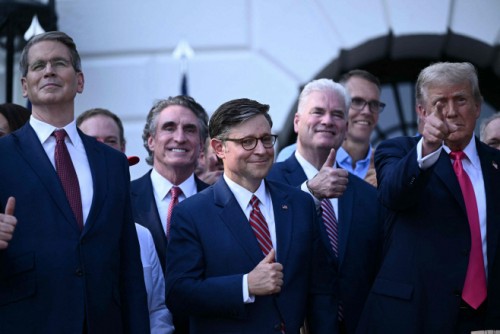 |
| U.S. Treasury Secretary Scott Bessent (left), Interior Secretary Doug Burgum, House Speaker Mike Johnson, and President Donald Trump raise their fingers in celebration at the White House during the signing ceremony of the “One Big Beautiful Bill Act” on July 4. / AFP-Yonhap News |
U.S. Treasury Secretary Scott Bessent warned on July 6 that countries failing to reach trade agreements with Washington will face reciprocal tariffs starting August 1, reverting to levels announced by President Donald Trump on April 2. His comments come as negotiations with key partners stall, raising the possibility of renewed trade tensions.
In an interview with CNN, Bessent said, “President Trump will send letters to some of our trade partners warning that if no progress is made, we will return to the tariff levels announced on April 2,” adding, “I think we’ll see many agreements very soon.”
Bessent emphasized that the administration is focusing its trade negotiations on 18 major partners that account for 95% of the U.S. trade deficit. However, he acknowledged significant “foot-dragging” by some countries during the talks.
He also said the U.S. plans to send letters to around 100 smaller trading partners, most of whom already face a 10% base tariff, stating, “They need to choose between reaching a deal or accepting the April 2 tariffs.”
Earlier, Bessent had issued a similar warning during a July 3 CNBC interview, urging caution as the tariff suspension period neared its end.
President Trump previously unveiled reciprocal tariffs on April 2 targeting 57 entities—including 56 countries and the European Union—with South Korea facing a 25% tariff. A 90-day suspension for all but China was announced on April 9, extending negotiations until July 8. As of now, only the United Kingdom and Vietnam have successfully finalized agreements.
Trump said on July 4 that he had signed letters specifying reciprocal tariff rates for 12 countries, which would be sent out on July 7.
Kevin Hassett, Director of the White House National Economic Council, suggested that countries making good-faith progress may receive an extension beyond the July 8 deadline.
In a CBS interview, Hassett stated, “We’re ready to talk with every country. Some deals are nearly done, so it’s possible their deadlines could be extended.” However, he noted that the decision to extend any deadline ultimately rests with President Trump.
Hassett pointed to recent agreements with the UK and Vietnam as models for other countries, saying Trump’s pressure is already prompting many to relocate production to the U.S.
White House Council of Economic Advisers Chairman Steven Miron echoed that progress is being made, saying on ABC News, “We’re hearing good things about negotiations with Europe and India. Countries seeking tariff reductions must make concessions.”
Indian media outlet CNBC-TV18 reported that a “mini trade deal” between the U.S. and India is likely to be finalized within 24 to 48 hours, citing sources who said the average tariff rate for Indian goods would be around 10%. This would represent a significant reduction from the 26% reciprocal rate announced by Trump in April.
The outlet also stated on X (formerly Twitter) that the mini deal discussions are nearly complete and that broader trade talks will begin starting July 9.
Most Read
-
1
-
2
-
3
-
4
-
5
-
6
-
7





















